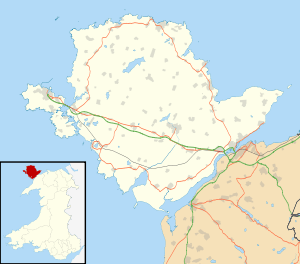Penysarn
| Penysarn | |
 Chapel Street, Penysarn |
|
 Penysarn |
|
| Population | (2001 census) |
|---|---|
| OS grid reference | SH460908 |
| Principal area | Anglesey |
| Ceremonial county | Gwynedd |
| Country | Wales |
| Sovereign state | United Kingdom |
| Post town | PENYSARN |
| Postcode district | LL69 9 |
| Dialling code | 01407 / 01248 |
| Police | North Wales |
| Fire | North Wales |
| Ambulance | Welsh |
| EU Parliament | Wales |
| UK Parliament | Ynys Môn |
| Welsh Assembly | Ynys Môn |
Coordinates: 53°23′13″N 4°18′54″W / 53.387°N 04.315°W
Penysarn (/pɛnˈsɑrn/; Welsh pronunciation: [pɛnˈsarn]) is a small village located in the north-eastern corner of Anglesey, Wales, and on the north-eastern side of Parys Mountain, at approximately 140–150 feet above sea level.
Name
Penysarn is sometimes written 'Pen-y-sarn', but in both cases, the 'y' is silent. The English translation from Welsh means 'the end of the causeway'.[1]
Amenities
The village has one public house called Y Bedol (currently closed), a camp site called Tyn Rhos Campsite, village shop and post office, an infants and junior school called Ysgol Penysarn, and a youth club. The village is well connected by regular bus routes.
The village is also the starting point of many officially designated circular tourist walks, including industrial heritage walks such as Llwybr Cadi Rondol, which takes walkers through the old copper mines at Mynydd Parys, and Llwybr Eilian, which takes walkers through Llaneilian and the surrounding countryside, including some of Anglesey's coastline which has gained Area of Outstanding Natural Beauty status.
History

Penysarn grew throughout the eighteenth century, close to what was once the world's largest copper mine, located at Parys Mountain. The village's expansion was due both to employment opportunities at the busy mines, and from providing subsidiary services such as cloggmaking, blacksmithing and baking. The ruins of a bakery still stand in the village, and the names of several of the older houses stem from the village's industrial past; with names translating from Welsh to "blacksmith's house", "blacksmith's field", etc.[2]
During this time, the Mountain and its locality, including Penysarn, had their own nationally recognised currency; the Parys Penny which was made from the copper mined at the mountain.[3]
Notable residents
- Lewis William Lewis ("Llew Llwyfo", 1831 - 1901), poet, novelist, journalist, conductor, singer and winner of several Eistoddfodau. Born in Penysarn.[4]
- John Eilian Jones (born 1904), Journalist, poet and broadcaster. Born in Penysarn.[5]
References
- ↑ http://www.bbc.co.uk/wales/whatsinaname/sites/placenametool/?q=penysarn
- ↑ http://www.museumstuff.com/learn/topics/Penysarn::sub::History
- ↑ http://www.angleseymining.co.uk/parysmountain/HomeParys.htm
- ↑ http://yba.llgc.org.uk/en/s-LEWI-WIL-1831.html
- ↑ http://en.wikipedia.org/w/index.php?title=Penysarn&action=edit